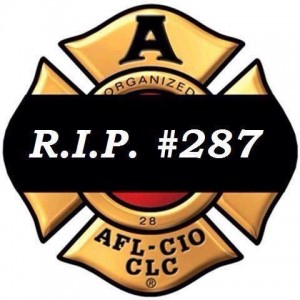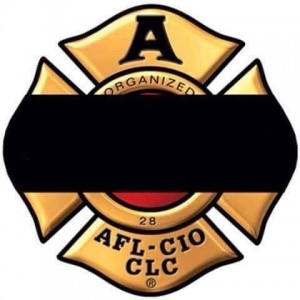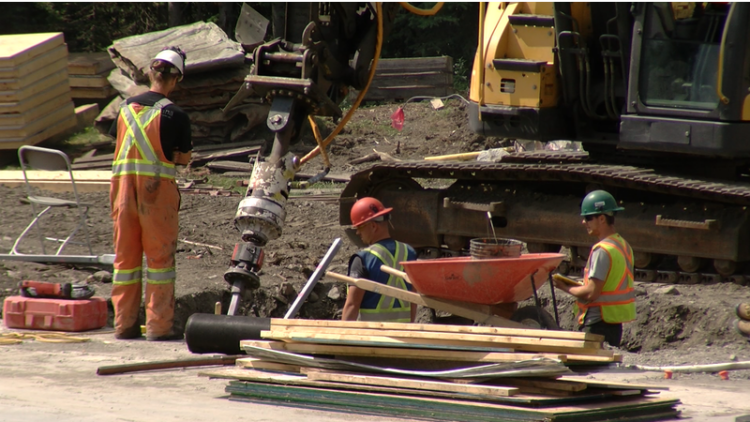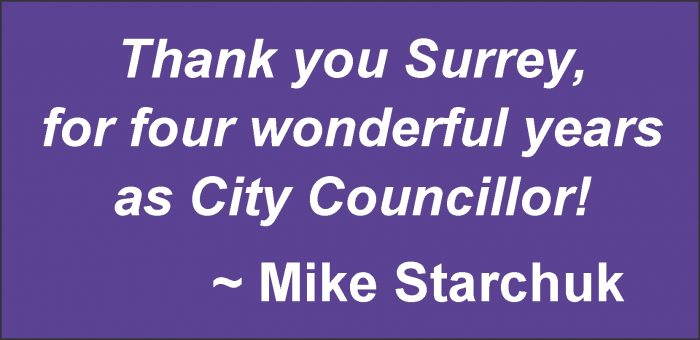Big Picture Stuff
Investing in Safe and Thriving Communities
The people that live in British Columbia are our greatest strength.
Over the past few years, we’ve seen our population grow. People want to live and raise their families in our communities. But at the same time, the impacts of climate change are putting pressure on some of our community infrastructure.
That’s why your New Democrat government, led by David Eby, is taking action to make sure that people in B.C. have what they need to build good lives in thriving, safe communities.
We’re building more hospitals and healthcare facilities, like a new hospital and cancer centre for Surrey in Cloverdale, and a new cancer centre in Kamloops. We’re also hiring and training more doctors, nurses, and other healthcare professionals.
We’re expanding, upgrading and building more schools, so that kids can learn and play in safe, modern spaces. And we’re investing in active transportation projects so that people of all ages can get around their communities safely by walking, rolling or cycling.
For many of us, the flooding that Abbotsford’s Sumas Prairie experienced in 2021 was one of the most devastating examples of climate change impacts we’ve seen. We are making critical upgrades to the Barrowtown Pump Station in Abbotsford so that farms and homes will be better protected from future flooding.
Across the province, more than 1,700 other projects are underway to help communities prepare for climate-related emergencies. From installing river-level sensors in Richmond, to building a dike along the Coldwater River in Merritt, we are working with communities to provide the support they need.
If a disaster does happen, people want to know that help and support will be there. We are providing more funding for Emergency Support Services so that communities can upgrade their ESS supplies, equipment, and procedures. We’re also providing new, streamlined training so that we can get more volunteers prepared to respond to help their neighbours during an emergency. After all, the resilience of a community depends on the strength and resilience of the people who live there.
B.C. is a great place to live, but we know there is always more we can do to make our communities even stronger. As your provincial government, we’re going to continue investing in people, and the services and infrastructure that they need to thrive.
~ Mike Starchuk – MLA for Surrey-Cloverdale
The above article is an an opinion piece, “Investing in Safe and Thriving Communities”, originally published by CFJC Today, on March 20, 2024
Thank You Surrey For Four Years
Surrey Biofuel – The Only Closed Loop System in North America
The Surrey Biofuel Facility is the only closed loop system in North America, and the Surrey First team brought this leading edge technology to Surrey to help reduce the regions’ carbon footprint.
We fuel our vehicles with 100% renewable gas.
Go to https://www.surrey.ca/city-services/13015.aspx … for more information.
Global BC Appearance
Yesterday (March 31) I was invited to appear on Global TV’s BC1 program, “Unfiltered” with Jill Krop. We discussed mental health issues as they apply to firefighters and to speak to Kevin’s passing. Jill’s compassion for firefighters and First Responders is clear. She really cares and I was pleased to be given the opportunity to speak (as a former firefighter and current City Councillor) to the past, the current and the future of mental health issues in the First Responder community. We know what the road ahead of us should look like to get the post discharge follow-up for those who have been diagnosed with an occupational mental health condition.
The BC Professional Fire Fighters Association will be meeting later this month with those who can affect the needed changes within WorkSafeBC. The circumstances of Kevin’s passing clearly identify the void that needs to be filled in the regulations and policies within WorkSafeBC. It’s up to the First Responder community to keep WorkSafe BC mindful that they need to fill this void to prevent a similar event from taking place in the future.
In addition, I would like to thank those who have visited my website, and those who take the time to leave comments on Kevin’s Story. I have received many direct messages and emails from folks wanting to get involved with this endeavor. I have also received many follow-up messages from other First Responders who have been diagnosed with PTSD, and their day to day struggles. Let’s keep these people in our thoughts and always, always, always, let them know, “they are not alone.”
Kevin’s Story Update
 I have been overwhelmed by the response to my last post, “Kevin’s Story.” If you missed that post, please scroll down… it is right below this one.
I have been overwhelmed by the response to my last post, “Kevin’s Story.” If you missed that post, please scroll down… it is right below this one.
Nearly 5000 people visited my Facebook page, and close to 3000 visitors to this website. While the majority of viewers to this website come from Canada, there were also many visitors from the US, Mexico, Australia, Brazil, and the UK, just to name a few. This indicates that mental health issues in the First Responder community are a global matter.
Thanks to those of you who made thoughtful and sincere comments that were respectful of Kevin’s grieving family. Thanks as well to those who left comments about mental health issues our First Responders face when they report for duty. We need to keep moving this forward within WorkSafeBC to ensure our First Responders have post post-discharge follow-ups with qualified mental health practitioners. Kevin’s story should not be repeated.
RIP Brother.
Kevin’s Story
Last week (March 3, 2015), we lost a Surrey Fire Fighter with nearly 20 years of experience. Kevin was dedicated to the Fire Service, to the BC Professional Fire Fighters’ Burn Fund, and to the Fire Fighters’ Association in Surrey. Kevin’s story is similar to other First Responders who suffered from mental health issues. The Vancouver Sun published an article (March 7, 2015) that spoke to Post Traumatic Stress Disorder (PTSD) in the First Responder community.
(Unfortunately, that online article has been removed by the Vancouver Sun.)
In Kevin’s case, a string of emergency response events starting in 2005, led to his diagnosis of PTSD in 2010. There was a claim for benefits to WorkSafeBC (WSBC) that was accepted by the Board. From the time he was recognized by WSBC for his PTSD (that is occupationally linked to Kevin), to his last days on earth, there weren’t any WSBC policies or mechanisms in place, to follow-up with Kevin’s mental health challenges.
 The loss of Kevin has raised many mental health based questions which all lead to a continuum of care that is not offered to workers who have had successful WSBC claims for mental health conditions. The Surrey Fire Fighters’ Association decided to use the BC Professional Fire Fighters’ Association (BCPFFA) Legislative Conference (March 9 and 10) to bring Kevin’s story forward. This conference was combined with the BC Fallen Fire Fighter Memorial, where those that passed away, due to occupational causes, are recognized as Line of Duty Deaths (LODD). Firefighters from all regions across BC were in attendance to recognize the addition of 13 firefighters to the Firefighter Memorial.
The loss of Kevin has raised many mental health based questions which all lead to a continuum of care that is not offered to workers who have had successful WSBC claims for mental health conditions. The Surrey Fire Fighters’ Association decided to use the BC Professional Fire Fighters’ Association (BCPFFA) Legislative Conference (March 9 and 10) to bring Kevin’s story forward. This conference was combined with the BC Fallen Fire Fighter Memorial, where those that passed away, due to occupational causes, are recognized as Line of Duty Deaths (LODD). Firefighters from all regions across BC were in attendance to recognize the addition of 13 firefighters to the Firefighter Memorial.
Vice President Dave Burns made an unscheduled appearance at the educational portion of the conference to tell Kevin’s story. At that time, VP Burns asked the delegation to share Kevin’s story while they were meeting with their MLAs. Kevin’s story grabbed the hearts of all there, and everyone was in agreement that something needs to be done to prevent another First Responder from harming themselves.
Kevin’s story can be paired down to a few simple facts. Kevin’s string of emergency response events began in 2005, which played a significant part in his PTSD diagnosis. These emergency events were occupationally-related and accepted by WSBC. After discharge from his mental health practitioner, there was no mechanism or policies in place by WSBC to follow-up on Kevin’s mental health status. Ultimately, Kevin’s PTSD condition played a role in his passing last week.
In his address to the BCPFFA delegation, VP Burns provided a possible solution for consideration. By way of analogy, when you go to a dentist, they always make sure you are contacted for follow-up. In the world of First Responders, who have been diagnosed with a mental health condition such as PTSD or Major Depression, First Responders are left to fend for themselves after they are discharged by a mental health professional. WSBC should consult with the mental health community of practitioners, to come up with a set of criteria for post discharge oversight.
A post discharge policy could be as simple as a follow-up schedule for those who have had a diagnosis of PTSD, Major Depression, or other recognized emergency service-related mental health condition. The follow-up interval could have less frequency over time. An example could be follow-up after discharge of every 3 months for a while, then 6 month intervals, move to annual, every 3 years and so on. The policy makers can consult with the mental health professionals to come up with the format to follow-up with these struggling First Responders.
As a former firefighter and a member of group peer defusers who were regularly used to talk firefighters through difficult incidents, I can assure everyone that not all firefighters react the same to similar incidents. The saying goes, “an abnormal reaction to a set of abnormal events is normal.” What the saying doesn’t cover is that each person reacts and recovers differently and each individual will recover and react at different speeds.
As a Critical Incident Scene Management peer defuser, I spoke with six firefighters in BC who had been formally diagnosed with PTSD. Now there are five. What I can tell you is ALL of these First Responders had been with me some time after their diagnosis, and the conversations always led to tearful conversations. These people have been affected by what they saw, smelled, heard, felt and did, while at work performing their duties. It’s time for the organization that is responsible for protecting BC workers to look at this in greater detail. WSBC made some progressive changes to the Act on July 1 2012. They created criteria for mental health practitioners to use, and created a better understanding of how First Responders are affected by what they are exposed to. No longer could First Responders be expected to be “tough enough” to deal with any incident, just because they were First Responders.
What needs to be done TODAY, is for WSBC to develop a policy, with mental health professionals, to deal with post discharge patients. We need to do this before another wife, child and friend has to endure this type of tragedy. My heartfelt condolences go to Kevin’s family. I hope someday, they will better understand that Kevin’s work-related mental health conditions, were likely contributing factors in his passing. I hope Kevin’s story will positively impact another First Responder, and produce changes to WSBC policy to better follow-up with First Responders with accepted mental health claims.

